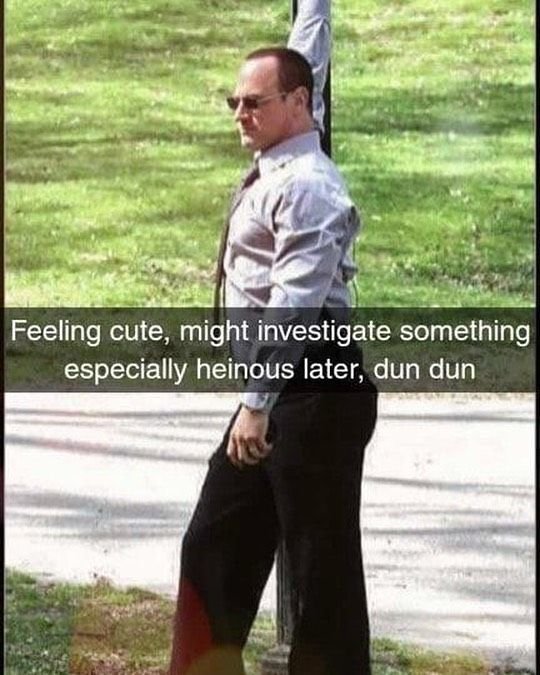A Matter of Life & Death: An Abolitionist’s Wrestle with Loving True Crime
Trigger Warning: Police, Murder, Crime, Violence
I take a lot of pride in my laptop stickers. I picked them out lovingly; I wanted onlookers to know exactly what I am about by peeping how I decorated my MacBook. It’s almost like an autobiography of sorts. A glimpse of the vampire fangs and bloodied house phone tells folks I’m a horror fan. The sunflowers and Miles Morales invite strangers to talk to me about Into the Spiderverse. The Milwaukee sticker makes it clear what I call home. At the center of it all, a sticker declares, “I met God. She’s Black.” This lets y’all know who I envision when I pray. And then, after careful inspection, viewers will notice two warring images. In the bottom left corner, in pink bubble letters, it reads CRIME SHOWS AND CATS. However, in letters just as bright and bold and just as proud, the sticker on the upper right hand corner states: FUCK ALL COPS.
I have loved true crime and cop shows since childhood. My ears perk up at the infamous “dun dun” from Law & Order: SVU. I recently binged over ten seasons of Snapped. Truthfully, if I hadn’t bombed AP Biology and AP Psychology in high school, I probably would’ve pursued a career in forensic psychiatry or science, a job path introduced to me through Forensic Files. Fiction or nonfiction, these stories of murder, betrayal, heartbreak, and violence capture my attention, and I cannot look away.
I am often questioned about what I get from this content, and my reasoning behind the fixation is not unique. I am morbidly curious. I also have a fascination with the human mind & body. Strangely enough, this media also provides me with a feeling of security. While women are overwhelmingly the victims of these gruesome murders, we are also the target audience for true crime television and podcasts. Like my sisters in the genre, the education component of this media serves as a survival guide. I am learning how to protect myself while also grieving and unpacking the ways this world so easily discards us.
While my passion for true crime has been nurtured since childhood, I was not introduced to the idea of abolitionism until college. (Shout out to my Black Feminisms and Psychology of Racism courses.) The more I learned about the treatment of imprisoned people, institutional anti-Blackness, and the 13th Amendment, the more I unlearned messages I received from the copaganda I grew up loving so much. The TV shows I watch(ed) focus on wrongdoing and punishment. They rarely promote themes of forgiveness, reconciliation, or even the possibility of redemption. The perpetrators are just that; they are or never were people with their own stories or loved ones. They are just their harmful deeds.
Working at UBUNTU Research & Evaluation has only further complicated this. Every time I sit on my couch and turn on my TV, I am reminded of how the world is. Every time I sit at my desk and start my work day, I am reminded of the world human beings deserve. What I want it to be. In my heart of hearts, I hold this value: Everyone is worthy to be in community, free from forced isolation. If I hold that to be true, that means the justice system as we know it cannot and will not ever be acceptable.
The true crime genre and its popularity can only exist alongside the current justice system. This is why many episodes praise the work of officers. In some docuseries, like Snapped, for example, there are interviews with investigators who worked on the case, and often, they brag about how their hard work and dedication made solving a case possible. So, of course, if you are an audience member who does not understand the horrors and history of policing, as I once didn’t, you see these “lionheart” officers sharing their courageous tales and walk away thinking they saved the day.
My biggest problem with the true crime genre and legal dramas is the glorification of police officers. (Let’s not forget, fuck all cops.) When I watch Law & Order: SVU, I am transported to a world where the officers care about what is happening in their universe. They believe survivors of sexual assault (most of the time.) They fight tooth and nail to uncover the truth. But then, before the credits roll, I am once again brought to that familiar wrestling, that nagging feeling of… yeah, but then those folks go to jail. And in prison, folks are not rehabilitated. Even in fictional worlds, I believe recovery and repair is possible.
My favorite podcast, Sistas Who Kill, is perhaps one of the best sources for true crime junkies fighting for liberation. The podcast centers on the stories of Black women murderesses. Audiences learn a lot about their upbringings, their traumas, and their hopes. They are human beings, first and foremost. In addition to discussing the case details, hosts MaRah and Taz also critique the retributive justice system and offer their input on how murderesses deserve fair trials and resources on how to strive for excellence inside and outside their cells. The podcast fanbase has an online discussion forum as well, where we talk about that week’s episode and how we want a world that loves Black women, both as harm prevention and as a restorative practice. It is a podcast that also (from my knowledge at the time of this writing) does NOT seek police help or insight, unlike others. (MaRah and Taz make their feelings about cops VERY clear.) It is not perfect by any means, as SWK DOES make money from its listeners and sponsorships. Still, the hosts DO work towards giving back to the community through fundraisers and donations, educating listeners on their rights, conducting research, and more. For me, true crime should be about education, community engagement, and challenging what we have been taught about crime and punishment.
While there is not currently a sticker on my laptop that demonstrates allllllllll of that, I do hope what’s there now continues to be a reminder, to myself mostly, that this work ain’t easy, but it doesn’t need to be done solo either. A lot of my loved ones who also seek abolition run into this. Being in community with folks who share my affinity for true crime and desire for prison abolition makes the journey easier; I am both held accountable and challenged to examine my beliefs and interests.
Where do we go from here? What steps do we need to take in order to transform the predatory justice systems? To quote Taz from Sistas Who Kill, I’ll offer this: “Talk to us. We talk back.” Let’s keep the conversation going. ❤
Instagram: @mikeycodyapollo | @ubunturesearch
Facebook: UBUNTU Research & Evaluation



